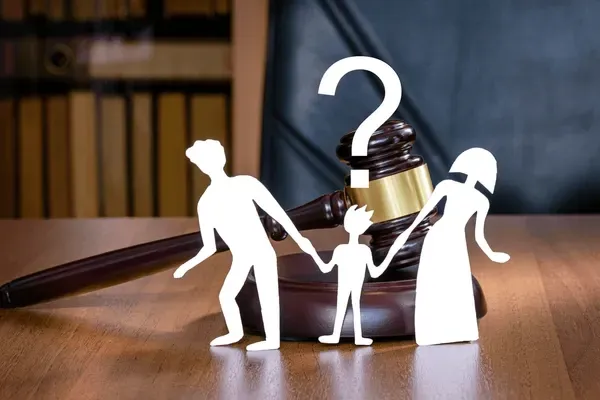Raising a Child With an Abusive Ex-Spouse
How to Co-Parent with an Abusive Ex-Spouse

Whether physical or psychological, domestic abuse is always a traumatic and painful experience. Once the abuse victim gets out of this situation, they never want to look back or go near their abusive spouse again. But when children are in the picture, the situation gets far more complicated.
For instance, despite the abuse you’ve endured, the court may think your ex is fit to co-parent with you. In that case, you’ll likely have to keep some form of communication with them, even if you don’t feel comfortable with it. That may seem cruel and unfair, but in the court’s eyes, the child benefits when having two parents in their life instead of just one.
Still, that doesn’t mean you shouldn’t take certain measures to protect yourself physically and mentally. In fact, setting firm boundaries and staying safe is the key to having a functional co-parenting relationship with your abuser. If you’re not sure how to do that, we’re more than happy to give you some advice.
How Does Co-Parenting Work?
Co-parenting is a term typically denoting a relationship between two former spouses who are still raising a child together. It involves sharing certain responsibilities, paying for the child’s needs together, and spending time with the child in turns. Even when a marriage ends fairly amicably, co-parenting can be difficult, as it requires continued communication that may be painful.
But when one spouse was abusive to another, things get even more complicated. In such a case, healthy co-parenting may seem almost impossible. However, as long as you keep your child’s best interests first and remember that they look up to you as a model of strength and responsibility, you’ll find a way to make it work. Just don’t forget to keep yourself safe in the process.
How to Safely Co-Parent With Your Abuser
Advocate for Yourself in Court
Before determining who should have primary custody and working out all the other co-parenting details, the court needs to know exactly what it’s dealing with. In other words, if your ex has been physically or mentally abusive to your child as well as to you, you need to bring it up. Sometimes, abuse victims fear that speaking out about the abuse in court could only worsen the situation. But in reality, the court needs these details to decide on the best course of action.
If the court finds out that your spouse has been abusive towards your child, too, it’s far more likely to place severe limitations on their visitation rights. That, already, is a small victory, as you won’t need to see them quite as often.
We should warn you that speaking out in court may result in your abuser’s anger and retaliation. That’s not a reason not to advocate for yourself, though. But if you feel like your ex could potentially harm you, make sure to file for a restraining order.
Set Clear Boundaries From the Start
Even if you no longer live with them and your contact is minimal, your abuser may still try to manipulate you. They may twist your words, try to turn your child against you, or attempt to present themselves as the victim in the scenario. And while you have to co-parent with them, you certainly don’t have to tolerate any of this. That’s why it’s important to set firm boundaries.
In other words, you need to listen to yourself and decide how much you can take. How many hours of communication can you tolerate? What communication methods are acceptable? What can your abuser talk to your child about, and what’s off-limits? All these questions may be difficult to answer, but you need to do it as quickly as possible and clearly set these boundaries from the start.
Have a Definitive Custody Schedule
When outlining your custody schedule — the time your child will spend with you and with their other parent — be as precise as possible. This custody schedule should reflect the desires of both parents as much as possible, but it should leave no room for discussion. Abusers frequently use ambiguity to overstep the boundaries by claiming there was a miscommunication or misunderstanding.
For example, the court might determine your child should spend Christmas Eve with one parent and Christmas Day with another. If there are no clear pick-up and return times, though, your ex could keep your child longer and infringe on your rights. Even worse, they could use this ambiguity to control you through your child. To avoid that, make a detailed schedule right off the bat and get a court order to enforce it if you have to.
Meet Only in Safe Locations
If you have to meet your abuser — for example, during pick-ups and drop-offs — make sure to do so somewhere safe. The location should be as neutral as possible and preferably a public space. In other words, don’t go to your ex’s house and don’t allow them to come to yours. Instead, your child’s school or daycare could be a convenient location.
And if you feel uncomfortable meeting your ex alone, even in a public place, bring someone along for support. That person will certainly relieve some of the tension and ensure no harm comes your way.
Report Any Breaches
Your abusive ex might try to breach the custody schedule or the separation agreement. For instance, they may constantly be late when picking up and dropping off your child, or they may schedule activities during your custody time. They could even go so far as to keep the child overnight despite the prohibition. These breaches constantly happen and give you every right to report them.
And that’s exactly what you should do. Even if the situation may not seem particularly serious, you can’t allow your abuser to start overstepping boundaries with no repercussions. Instead, remain calm and contact your attorney. They will send a letter to your ex, reminding them of the agreement and their responsibilities. If that doesn’t work, you can take it further — even file a motion for contempt.
What you shouldn’t do is confront your abuser directly. That opens the door to more abuse, and you absolutely shouldn’t expose yourself to that.
In Conclusion
Co-parenting with your abusive ex is extremely challenging and requires patience, strength, and perseverance. Your abuser won’t make it easy for you, but remember that you don’t have to be alone in this. Ask for help and support when you need it, and someone will certainly answer. And don’t forget to put your safety first, set firm boundaries, and stick up for yourself when necessary. That’s the only way to protect yourself while allowing your child to still communicate with their other parent.
When dealing with the complexities of raising a child with an abusive ex-spouse, it is vital to consider the importance of legal support. To effectively navigate the challenges of such a situation, you may want to hire a lawyer for child support claims. An experienced attorney can help ensure that your rights are protected and that your child's best interests are prioritized during the legal process












